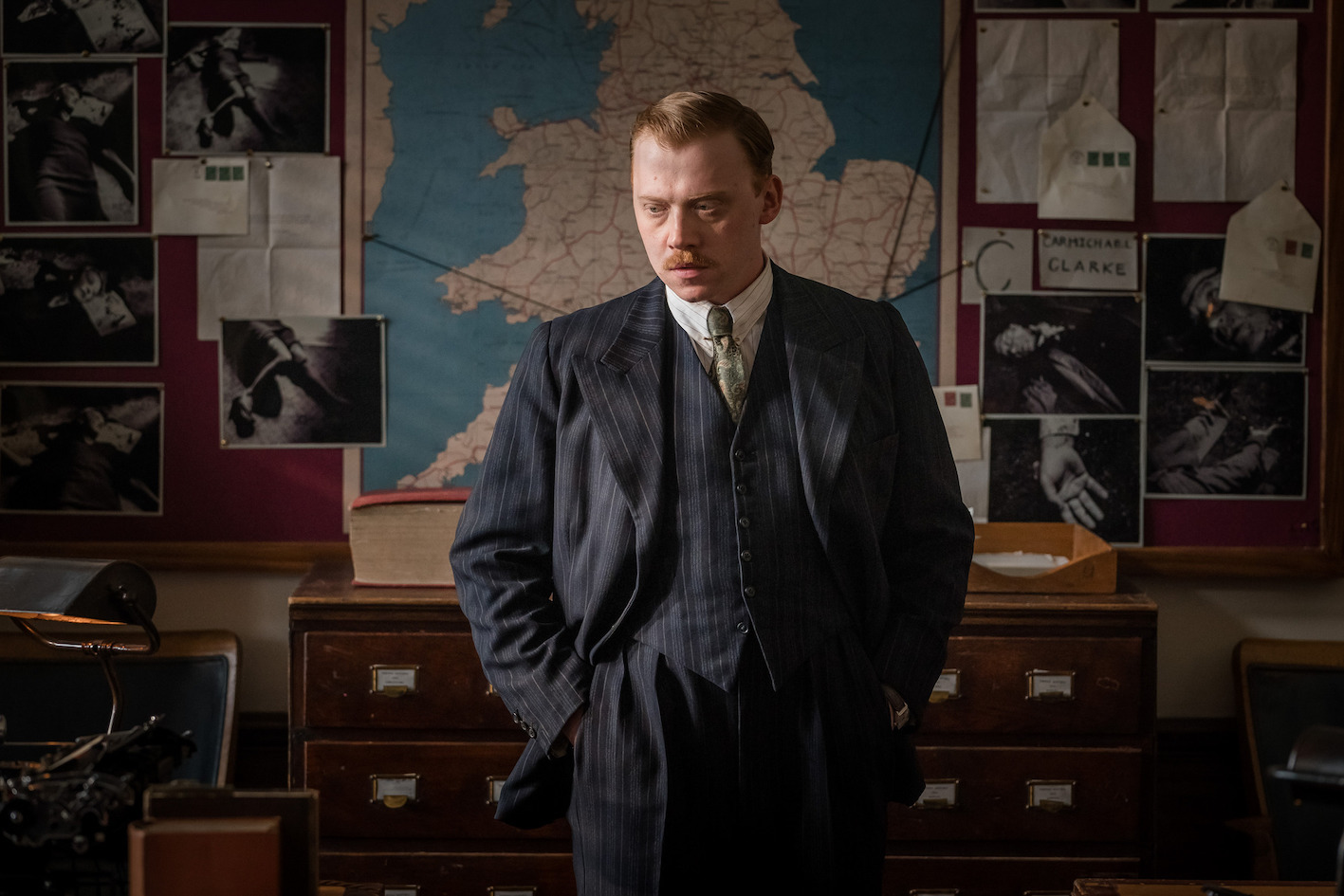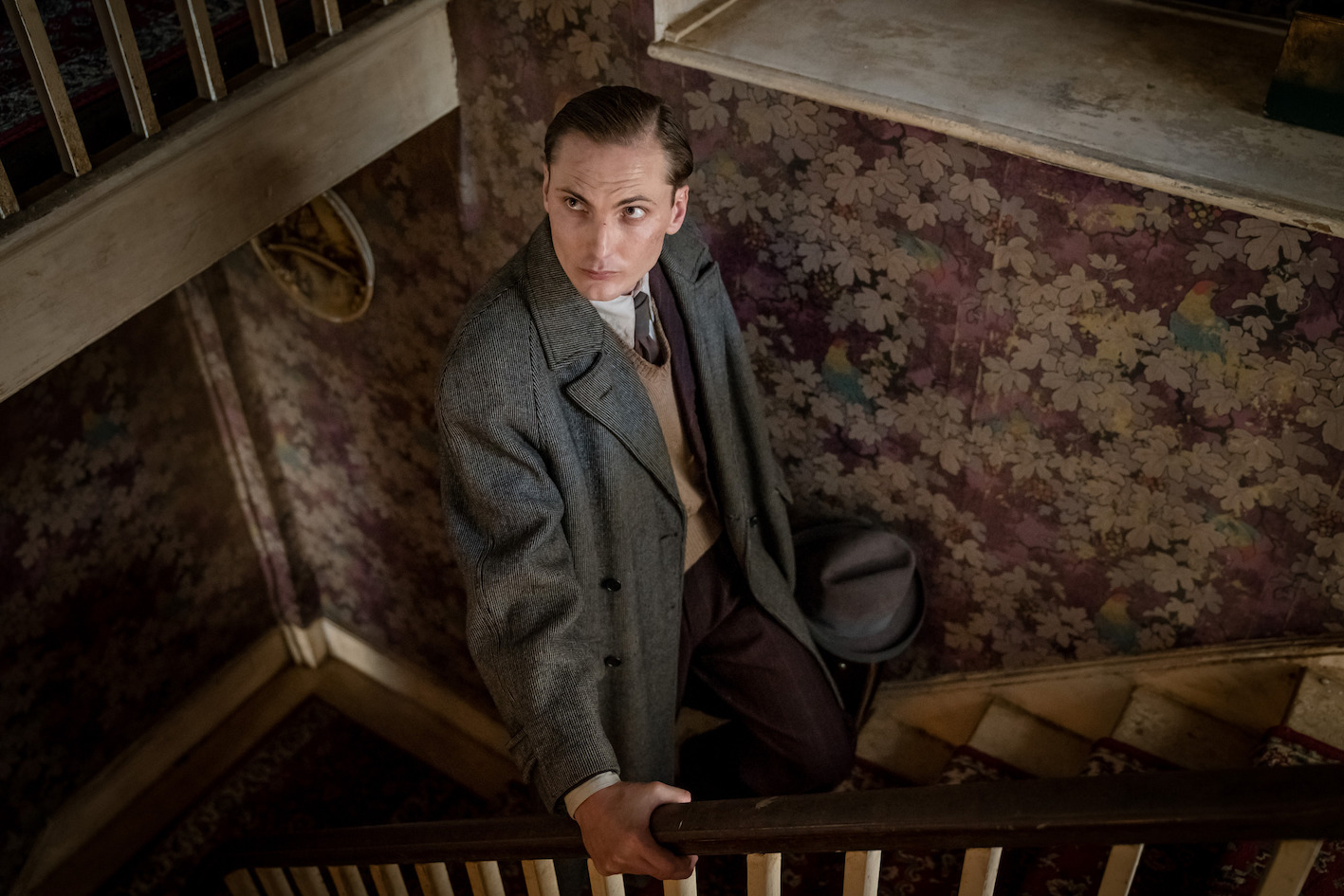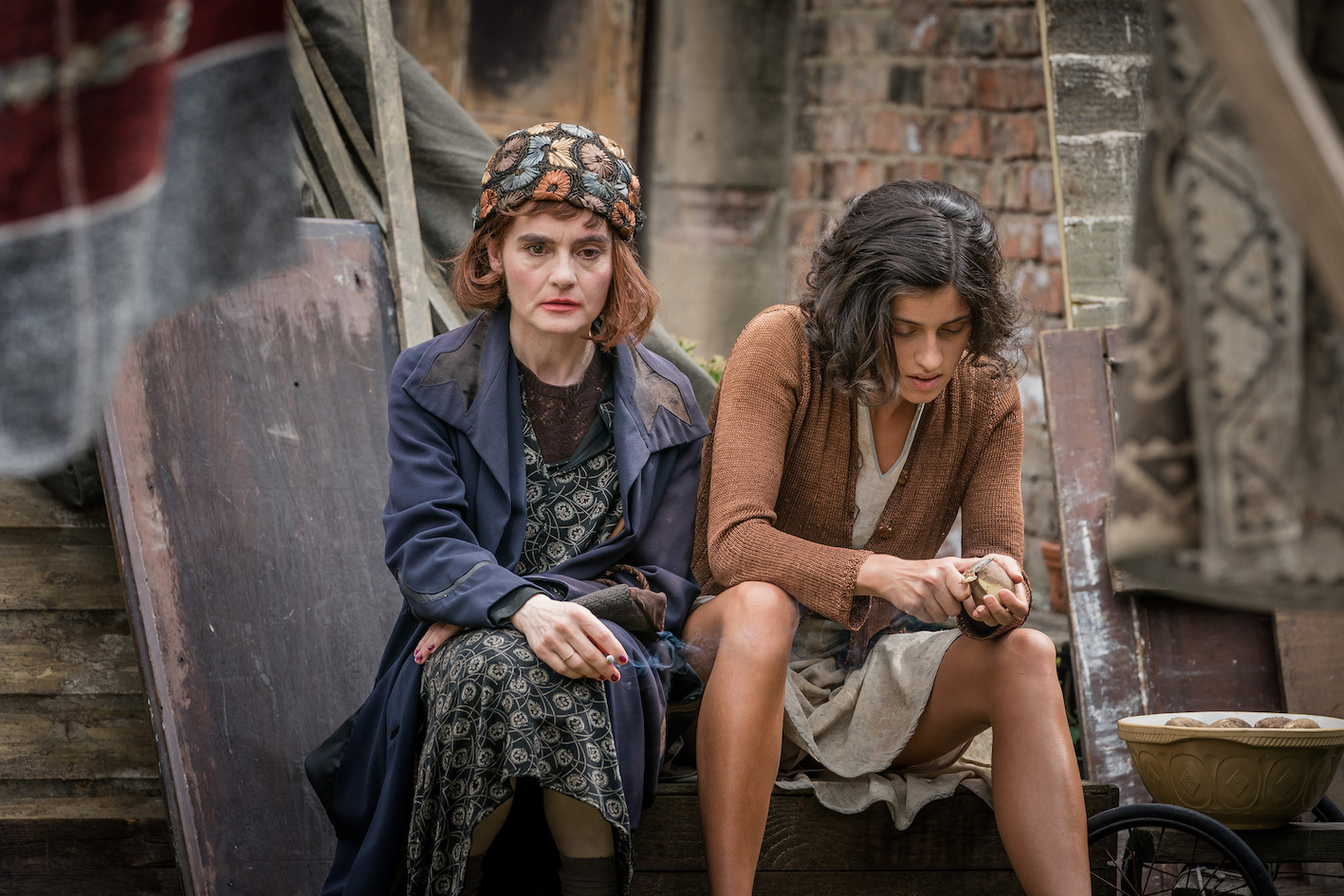The ABC Murders, BBC One, review - John Malkovich's dark reboot of Poirot | reviews, news & interviews
The ABC Murders, BBC One, review - John Malkovich's dark reboot of Poirot
The ABC Murders, BBC One, review - John Malkovich's dark reboot of Poirot
Sarah Phelps's seasonal Agatha Christie strips the gloss off the little Belgian detective

Sarah Phelps’s annual reboot of a canonical murder mystery by Agatha Christie has rapidly established itself as a Christmas staple of TV drama.
The estate's guardians, who trade as Agatha Christie Ltd, sanctioned something similar when it placed Murder on the Orient Express in the care of Kenneth Branagh, who planted a luxuriant moustache across Poirot’s face that looked like a pair of leaping ferrets. With his unsettling eyes and other-worldly aura, John Malkovich represents a different sort of thought experiment. A former resident of France, his accent is passable without begging for attention. His Poirot seemed haunted by his own shadow. When we first saw him he was warily looking over his own shoulder: the little Belgian thesp has had the theatre in him drained away, as if been caught in the middle of a traumatising transfusion, all the old blood gone, the fresh supply yet to pump through his old veins. The idea is to bury the old Poirot known to millions from the prissy popinjay bodied forth by David Suchet for a quarter of a century until he solved his last case in 2013. Phelps does this partly by taking the usual array of liberties. Poirot's reverential police sidekick Inspector Japp (Kevin McInally) is killed off in his allotment, felled by a heart attack, which leaves Poirot exposed to the withering disdain of young Inspector Crome (an impressively hangdog Rupert Grint, pictured above).
The idea is to bury the old Poirot known to millions from the prissy popinjay bodied forth by David Suchet for a quarter of a century until he solved his last case in 2013. Phelps does this partly by taking the usual array of liberties. Poirot's reverential police sidekick Inspector Japp (Kevin McInally) is killed off in his allotment, felled by a heart attack, which leaves Poirot exposed to the withering disdain of young Inspector Crome (an impressively hangdog Rupert Grint, pictured above).
Using Crome as a mouthpiece, Phelps trolls the old Poirot as a spent narcissist who once upon a time famously crept around Cluedo country houses solving insoluble crimes in which candlesticks are rammed in heiresses’ eye-sockets and guts twitch in the conservatory. This could not be read as anything other than a savage take-down of the safety-first formula adopted for decades by the Christie industry. The makers of the full set of ITV Poirots may well feel they’ve been eviscerated with the stanley knife in the back-to-the-drawing-board room. The adaptation ramps up the idea that Poirot has gone beyond his prime. It makes him a figure of ridicule with the dye dripping from his goatee (no mere tache for this Poirot) while his celebrity stands tarnished. Scotland Yard, having launched an investigation into his past, have come up with no proof that he ever really existed: “You’re not who you say you are,” growled Crome. “Who the hell are you?”
The adaptation ramps up the idea that Poirot has gone beyond his prime. It makes him a figure of ridicule with the dye dripping from his goatee (no mere tache for this Poirot) while his celebrity stands tarnished. Scotland Yard, having launched an investigation into his past, have come up with no proof that he ever really existed: “You’re not who you say you are,” growled Crome. “Who the hell are you?”
This loosely places Poirot in that very contemporary gallery of great men who have fallen from grace. He is haunted by a secret from his own past which may well have something to do with a country house occupied by mad Lady Hermione Clarke (Tara Fitzgerald), who proudly stands next to the detective in an old group photograph.
That’s one mystery. The other is why a psychologically frail young stocking salesman with cheekbones and a high forehead called Cust (a fine, suggestible performance Eamon Farren, pictured above) would appear to be bumping off women with violent relish and sending Poirot letters about the fun he’s having. Not that we’ve seen him at it. Those familiar with the novel need not assume that Phelps will photocopy the plot. The original, published in 1936 but here set three years earlier, borrowed from Bleak House by flitting experimentally between first- and third-person narrators. Phelps and director Alex Gabassi retain the ghost of that structure by introducing each character with a caption as if an invisible person with a typewriter is in charge of the story.
The original, published in 1936 but here set three years earlier, borrowed from Bleak House by flitting experimentally between first- and third-person narrators. Phelps and director Alex Gabassi retain the ghost of that structure by introducing each character with a caption as if an invisible person with a typewriter is in charge of the story.
There is no getting away from the fact that there is a country house in this murder mystery too, but not as you'd know it. The stark and ravishing palette is all rabid colours, glowering red brick and amped-up twilight. And there is a rank stench of seediness, mainly located in the boarding house where Shirley Henderson’s racist landlady pimps out her own daughter (Anya Chalotra, both pictured above) to the tenants. “I prefer my gentlemen to not be cavalier in the use of the lavatory paper," she said. "It blocks up the pipes and then who’s got to get in there with a stick and break it up? Me, that’s who.” It’s as if Phelps is writing her own job description, cleaning up Agatha Christie's airways after all those stodgy old dramas. Next we need to see her have a go at Miss Marple, played by someone tangy and un-mumsy like Eileen Atkins or Juliet Stevenson. In the mean time, this is another gripper.
Add comment
The future of Arts Journalism
You can stop theartsdesk.com closing!
We urgently need financing to survive. Our fundraising drive has thus far raised £49,000 but we need to reach £100,000 or we will be forced to close. Please contribute here: https://gofund.me/c3f6033d
And if you can forward this information to anyone who might assist, we’d be grateful.

Subscribe to theartsdesk.com
Thank you for continuing to read our work on theartsdesk.com. For unlimited access to every article in its entirety, including our archive of more than 15,000 pieces, we're asking for £5 per month or £40 per year. We feel it's a very good deal, and hope you do too.
To take a subscription now simply click here.
And if you're looking for that extra gift for a friend or family member, why not treat them to a theartsdesk.com gift subscription?
more TV
 Coldwater, ITV1 review - horror and black comedy in the Highlands
Superb cast lights up David Ireland's cunning thriller
Coldwater, ITV1 review - horror and black comedy in the Highlands
Superb cast lights up David Ireland's cunning thriller
 Blu-ray: The Sweeney - Series One
Influential and entertaining 1970s police drama, handsomely restored
Blu-ray: The Sweeney - Series One
Influential and entertaining 1970s police drama, handsomely restored
 I Fought the Law, ITVX review - how an 800-year-old law was challenged and changed
Sheridan Smith's raw performance dominates ITV's new docudrama about injustice
I Fought the Law, ITVX review - how an 800-year-old law was challenged and changed
Sheridan Smith's raw performance dominates ITV's new docudrama about injustice
 The Paper, Sky Max review - a spinoff of the US Office worth waiting 20 years for
Perfectly judged recycling of the original's key elements, with a star turn at its heart
The Paper, Sky Max review - a spinoff of the US Office worth waiting 20 years for
Perfectly judged recycling of the original's key elements, with a star turn at its heart
 The Guest, BBC One review - be careful what you wish for
A terrific Eve Myles stars in addictive Welsh mystery
The Guest, BBC One review - be careful what you wish for
A terrific Eve Myles stars in addictive Welsh mystery
 theartsdesk Q&A: Suranne Jones on 'Hostage', power pants and politics
The star and producer talks about taking on the role of Prime Minister, wearing high heels and living in the public eye
theartsdesk Q&A: Suranne Jones on 'Hostage', power pants and politics
The star and producer talks about taking on the role of Prime Minister, wearing high heels and living in the public eye
 King & Conqueror, BBC One review - not many kicks in 1066
Turgid medieval drama leaves viewers in the dark
King & Conqueror, BBC One review - not many kicks in 1066
Turgid medieval drama leaves viewers in the dark
 Hostage, Netflix review - entente not-too-cordiale
Suranne Jones and Julie Delpy cross swords in confused political drama
Hostage, Netflix review - entente not-too-cordiale
Suranne Jones and Julie Delpy cross swords in confused political drama
 In Flight, Channel 4 review - drugs, thugs and Bulgarian gangsters
Katherine Kelly's flight attendant is battling a sea of troubles
In Flight, Channel 4 review - drugs, thugs and Bulgarian gangsters
Katherine Kelly's flight attendant is battling a sea of troubles
 Alien: Earth, Disney+ review - was this interstellar journey really necessary?
Noah Hawley's lavish sci-fi series brings Ridley Scott's monster back home
Alien: Earth, Disney+ review - was this interstellar journey really necessary?
Noah Hawley's lavish sci-fi series brings Ridley Scott's monster back home
 The Count of Monte Cristo, U&Drama review - silly telly for the silly season
Umpteenth incarnation of the Alexandre Dumas novel is no better than it should be
The Count of Monte Cristo, U&Drama review - silly telly for the silly season
Umpteenth incarnation of the Alexandre Dumas novel is no better than it should be
 The Narrow Road to the Deep North, BBC One review - love, death and hell on the Burma railway
Richard Flanagan's prize-winning novel becomes a gruelling TV series
The Narrow Road to the Deep North, BBC One review - love, death and hell on the Burma railway
Richard Flanagan's prize-winning novel becomes a gruelling TV series

Comments
The adaptation is a nasty
By putting 'left leaning',
Has anyone actually read the
Does anyone remember in the
I guess that the Christie's
why do the BBC have to spoil
The acting, production values
Very disappointing. Awful